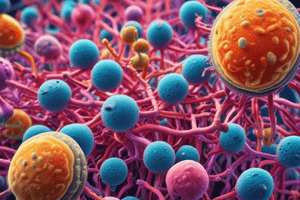Podcast
Questions and Answers
What serves as the basic unit carrying out essential functions in living organisms?
What serves as the basic unit carrying out essential functions in living organisms?
- Proteins
- Organs
- Tissues
- Cells (correct)
Which scientist made a significant milestone by discovering cells in 1665?
Which scientist made a significant milestone by discovering cells in 1665?
- Louis Pasteur
- Gregor Mendel
- Robert Hooke (correct)
- Anton van Leeuwenhoek
What is the genetic material found inside each cell?
What is the genetic material found inside each cell?
- Lipids
- Proteins
- Carbohydrates
- DNA and RNA (correct)
Which molecule stores information needed to build proteins vital for various processes?
Which molecule stores information needed to build proteins vital for various processes?
What did Charles Darwin describe as a process where species undergo changes over generations?
What did Charles Darwin describe as a process where species undergo changes over generations?
How does RNA function in relation to protein synthesis?
How does RNA function in relation to protein synthesis?
What does 'natural selection' imply?
What does 'natural selection' imply?
How do predator-prey cycles impact populations?
How do predator-prey cycles impact populations?
What is the main focus of synthetic biology?
What is the main focus of synthetic biology?
Which field involves manipulating matter at atomic scales?
Which field involves manipulating matter at atomic scales?
How does studying ecological interactions aid in conservation efforts?
How does studying ecological interactions aid in conservation efforts?
What drives innovation and progress towards a better future according to the text?
What drives innovation and progress towards a better future according to the text?
Flashcards are hidden until you start studying
Study Notes
Exploring Science: A Journey through Biology
Biology is one of science's most captivating fields, offering insights into our natural world and answering fundamental questions about life itself. In this exploration of science, we'll dive deep into the realm of biology — its foundations, key concepts, and modern breakthroughs.
Life’s Building Blocks: Cells
At the heart of all living organisms lie cells. These minute structures serve as the basic unit carrying out essential functions like metabolism, growth, and reproduction. Discovering their existence marked a major milestone for scientist Robert Hooke in 1665, forever changing how we perceive life. Today, there are over two dozen recognized types of cellular structures with diverse roles within multicellular organisms.
Genetic Material: DNA and RNA
Inside each cell resides genetic material known as deoxyribonucleic acid (DNA) and ribonucleic acid (RNA), which dictate unique traits passed down from generation to generation. DNA stores information needed to build proteins vital for various processes such as enzyme production, while RNA acts as a messenger between DNA and protein synthesis. Understanding these molecules has led us to revolutionize fields ranging from medicine to agriculture.
Evolutionary Theory: Adaptation and Natural Selection
One crucial tenet of biology is evolution; Charles Darwin described it as a process where species undergo changes over generations due to selective pressures acting upon them. This concept, coined 'natural selection,' implies that certain inherited characteristics conferring survival advantages will become more common across time. The relationship between variation, heredity, adaptation, and extinction remains central to understanding biological complexity and diversity today.
Ecosystems and Species Interactions
Beyond individual species lies ecological communities composed of interconnected relationships. An ecosystem consists of abiotic components (nonliving elements like climate and soil) and biotic ones (organisms interacting directly or indirectly). Various interactions shape ecological dynamics. For instance, predator–prey cycles stabilize populations, while mutualistic partnerships benefit both parties involved. Studying these patterns helps scientists predict environmental impacts, contributing to conservation efforts worldwide.
Modern Advances: Synthetic Biology and Nanotechnology
With an ever-evolving scientific landscape, cutting-edge areas continue to emerge. One such field is synthetic biology, combining principles of engineering with biology for designing and constructing new biological systems. Applications range from biofuels and sustainable chemicals to novel therapeutics to combat diseases. Similarly, nanobiotechnology involves manipulating matter at atomic scales. It offers unprecedented insight into life, from molecular machines built inside living cells to microscopic devices capable of diagnosing illnesses.
Exploring science through biology provides fascinating answers to humankind's age-old quest to understand nature. By illuminating complex systems, discovering hidden mechanisms, and pushing boundaries, biological sciences drive innovation and progress towards a better future.
Studying That Suits You
Use AI to generate personalized quizzes and flashcards to suit your learning preferences.




